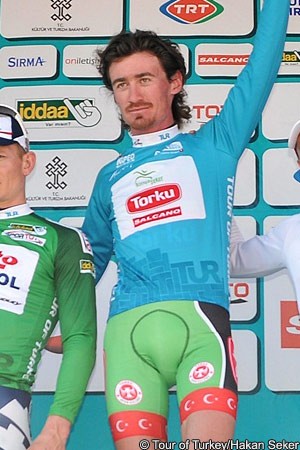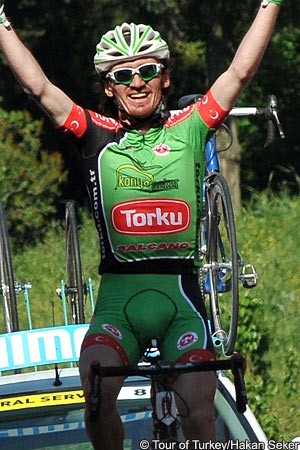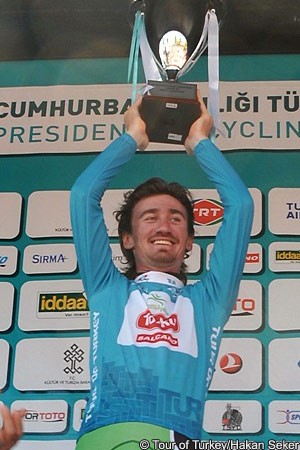Rider said to have retired; prizemoney can’t be distributed until case decision is official
 He won the 2013 Presidential Tour of Turkey in April, he was announced as having tested positive in July, but until UCI confirmation Mustafa Sayar is still, officially at least, the winner of the 2.HC event. However his name has been taken off the race website and one of the organisers believe it’s just a matter of time before his positive is confirmed. Once that is done, prizemoney will be distributed and the race can move on.
He won the 2013 Presidential Tour of Turkey in April, he was announced as having tested positive in July, but until UCI confirmation Mustafa Sayar is still, officially at least, the winner of the 2.HC event. However his name has been taken off the race website and one of the organisers believe it’s just a matter of time before his positive is confirmed. Once that is done, prizemoney will be distributed and the race can move on.
Sayar’s victory in the 2013 event led to raised eyebrows at the time, with his considerable jump in level compared to what he had achieved before acting as a red flag.
He had finished third-from-last in the 2012 edition and while he rode some of that race in the service of Torku team-mate Ivailo Gabrovsky, he had been only 173rd out of 187 finishers on the mountain stage to Elmali, where Gabrovsky took over the race lead.
Sayar finally ended up finishing the race one hour 41 minutes 31 seconds off his team-mate, who subsequently tested positive for EPO. One year later, though, he was the strongest rider in the event and seized the final overall victory with an authoritative display.
Dismissive about questions as to his improvement and also to the scepticism shown by several riders in the bunch, Sayar’s insistence that he was innocent crumbled when it was revealed on July 15th that he had tested positive during the earlier Tour of Algeria.
The UCI subsequently confirmed the news, saying that the 24 year old had provided a sample on March 11th which showed traces of EPO. He was provisionally suspended as a result.
Contacted by VeloNation in recent days, the UCI said that the situation is still to reach a conclusion. “Mustafa Sayar is currently provisionally suspended which means that until the closure of the procedure, both rankings and results of the Tour of Turkey are upheld,” UCI spokesman Louis Chenaille stated.
The governing body’s legal department is currently dealing with the issue, and there is no indication as to when a final announcement will be made.
However Presidential Tour of Turkey organisation director Aydin Ayhan Guney told VeloNation Monday that Sayar has been fired by the Torku team and appears to have quit the sport. His name has also been taken off the race website; the UCI may be yet to announce the final outcome, but the organisers have acted.
“I talked to his coach yesterday,” he said. “I understand that the B sample result arrived to the team and the rider. He is out of contract now, and is no longer involved in cycling. I believe he is working at something different.
“However nothing has come yet from the [Turkish] federation. They will talk about the penalty in a disciplinary hearing and we will see then what he is given, be it two years, four years or whatever. For us he is no longer the winner of the Presidential Tour of Turkey, but we need to wait for the official notification before we can change the results.”
He is frustrated by the delay. “Last year the same thing happened – everyone knew about Gabrovsky’s result, but it took a long time for the final outcome to happen. There were official letters to the team, but the UCI only told us very late that his B sample was positive. It meant that we had to wait to be able to change the official result.
“That complicated things in relation to the payment of prizemoney, and this year it is the same. We have to wait until we get the official notification that he is disqualified, then we can act.
Even when that is done, there is a further headache. Natnael Berhane (Europcar) finished second to Sayar, 41 seconds back. It seems logical that if Sayar is disqualified, the runner-up will then become the winner. However if the stage-end time bonuses of ten, six and four seconds are considered, then Cofidis’ Yoann Bagot may well end up the victor.
He finished three seconds behind Berhane in the general classification. However he was also second on stage six, which was won by Sayar. Take the Turkish rider out of the equation and Bagot’s six second time bonus becomes a ten second one; the four additional seconds he will then have in hand will carry him past Berhane in the general classification, and into the final leader’s jersey.
It’s a mess, and something which is a source of great frustration to Ayhan Guney and others.
A double nightmare:
 At the time of the race, Ayhan Guney seemed uneasy about Sayar’s dominance. He spoke to VeloNation after the rider took over the leader’s jersey, and expressed hope that he was clean and that it wouldn’t be another case of a previously little-known rider dominating bigger teams and then testing positive.
At the time of the race, Ayhan Guney seemed uneasy about Sayar’s dominance. He spoke to VeloNation after the rider took over the leader’s jersey, and expressed hope that he was clean and that it wouldn’t be another case of a previously little-known rider dominating bigger teams and then testing positive.
He said that the Gabrovsky case had meant that it was made very clear to the Torku directors before the start that the team was being readmitted on the strict understanding that its riders were clean. Assurances were given, but things worked out badly again.
Unlike the WorldTour and ProContinental teams in the event, Torku had no requirement by the UCI to be part of the biological passport programme. Its riders were not as closely scrutinised, and when Sayar began riding far stronger than he had the previous year, some eyebrows were raised within the peloton.
Having been third from last in 2012, he seemed a very different rider this time round. He finished third on the Elmali stage, and then took over at the top with an assertive performance on stage six. Sayar broke clear on the final climb to Selcuk, hitting the line eighteen seconds ahead of Cofidis pair Bagot and Nicolas Edet, and deposing the then-leader Berhane.
The performance was greeted with scepticism by several in the bunch. Marcel Kittel (Argos Shimano) appeared to be referring to Sayar when he tweeted ‘I was not often in my life so angry about a result of someone else. And I see many people around me feeling the same.’
Astana rider Kevin Seeldrayers was similarly sceptical, as this video interview shows.
Challenged as to his dramatic improvement, Sayar seemed dismissive. On the day of his mountain stage win, he was told by a journalist during the press conference that some riders in the peloton had doubts. “What would you say to your colleagues?” he was asked.
His response was brief. “I don’t have an answer for them,” he said (see video), before waiting for the next question.
The questions surfaced again in the press conference given at the conclusion of the race.
“As I told you before, we prepared for this race for maybe six months, doing a very hard tempo of training,” he explained, when asked about that jump in standard by VeloNation (see video interview here). “We were always abroad in foreign competitions. These competitions made me develop very much.
“Psychologically I was in a very good situation, I felt very good psychologically. I know that high altitude training also makes very good competition. Where I live is a place of very high altitude.”
When it was put to him that his team-mate had tested positive the previous year and that he had now made a similar jump, he rejected any suggestions that something was amiss. “Gabrovsky now is in the past. Now I am very confident of myself and I don’t think I will have this kind of problem,” he said.
Some picked up on the phrase ‘I don’t think,’ noting that it was different to saying that he wouldn’t – or couldn’t – have a problem.
Still, he insisted that any doubts raised were unfair. “I am not happy to receive these kind of questions while there is nothing to be proven about myself,” he said, before reiterating, “I am not happy to be asked these kind of questions.”
Positive test and aftermath:
 When the news came through that he had provided a positive A sample for EPO, he started asking questions of his own.
When the news came through that he had provided a positive A sample for EPO, he started asking questions of his own.
He noted that the A sample had been used up in running testosterone tests and that the B sample had subsequently been split in two by the French lab at Châtenay Malabry and tested for EPO.
He cried foul at this, and suggested a conspiracy to the Turkish website www.mtbtr.com. “I don’t know whether it is a error by the laboratory but I think it was a deliberate, intentional finding. A French laboratory delivers the results. I raced French teams in TUR, beating all French riders. There are three French riders just behind me in the general classification.” [Berhane is actually Eritrean – ed.]
“I am convinced that if I would have the chance to have my sample tested in another laboratory, the result would be negative,” he claimed. “But I don’t think that CML would eat its words in a second test. It is unclear what was the outcome of the A sample, they opened the B sample, delivered this result. Would they test the B sample again? I think this is a dead end.”
The laboratory insisted that it followed the rules and didn’t break any regulations. “All the analyses have been performed according to the official procedures,” the head of the laboratory Dr. Francois Lasne said to MTBTR. “The B sample has been partly used as a “A” sample and there is still urine in the B bottle (that has been opened and re-sealed in the presence of a witness) that can be used as a “B” sample.”
VeloNation checked this interpretation of the rules with WADA and was referred to Article 5.2.2.12.1.2 of the International Standard for Laboratories, which indeed does allow for the B sample to be split in two and analysed.
Things have been quiet since then but if the information Ayhan Guney received is accurate, Sayar has been dropped by Torku and has walked away from the sport. An official announcement on his positive will presumably follow soon from the UCI.
Asked what will happen next year with the Torku team and if they will be on the start list again, he said that the race may not have any choice. However if the squad is there, it will have to follow the same pre-race checks as other teams. It will be under far closer scrutiny than before.
“I don’t think they can be excluded because they are the only team in Turkey,” he told VeloNation. “ But we had a long discussion about it with the federation. Somehow we have to find a way to ensure this [similar problems] don’t happen.
“We already announced that all the teams coming to the Tour of Turkey have to have a biological passport in future. I think Torku must now apply to be part of the biological passport programme, so we will see how things go.”
What’s clear is that the situation has been of great frustration to Ayhan Guney and, presumably, the rest of the organisation team. The race will have its 50th edition next year, and he said that big efforts will be made to ensure that the race is something special. Having a credible winner will be surely the most crucial part of that.